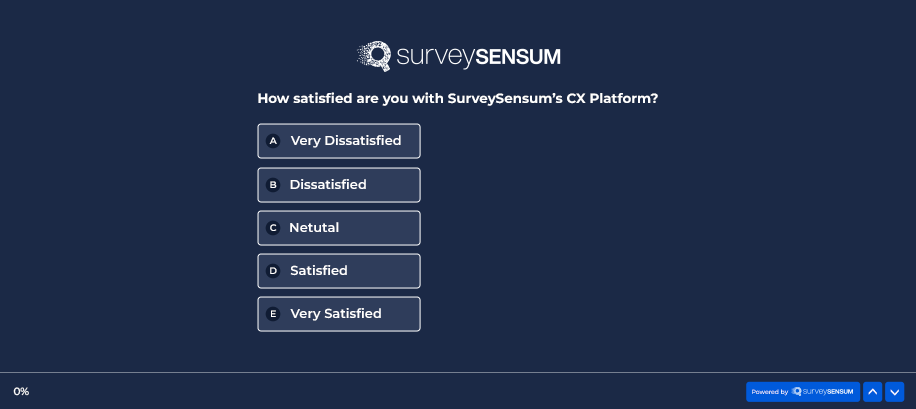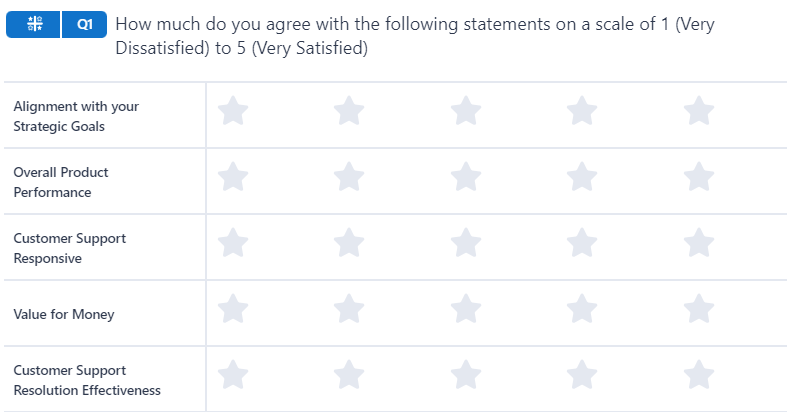9 Ways to Improve NPS Response Rates
Read More

Did you know that asking the right questions can make all the difference in gathering meaningful feedback?
Picture this: You receive a CSAT survey after your recent purchase at a clothing brand. The survey had only 5 questions but all of them were open-ended questions, I mean who has the time for that? So, naturally, you give one-word answers just to get it over with. Now, think about the authenticity of the feedback received by the company, do you think your feedback will be actionable for the? No, because they are too vague and are incapable of expressing your sentiment.
Asking the right question in a customer feedback survey not only gives you valuable insights into your customers’ experiences but also demonstrates your commitment to understanding and improving their journey with your company.
But how to do that? Well, simple, by creating an effective survey design with good survey questions using a survey builder tool.
So, let’s master the art of creating effective survey design by understanding the importance of asking the right questions and exploring 30 good survey questions that can help you unlock valuable feedback from your customers.
But before that, how about we understand what are good survey questions?
A good survey question is one that effectively captures the information needed to achieve the survey’s objectives while being clear, concise, and relevant to the customers. Each question should be constructed in an easily understandable manner, free from ambiguity, and devoid of jargon or technical language that may confuse participants.
When customers clearly understand the question being asked, they are more likely to provide accurate and meaningful responses, thereby enhancing the reliability and validity of the survey data.
Let’s explore further and see some examples of good survey questions.
Here are the best 30 good survey questions examples.
1. Demographic Survey Questions
2. Market Research Survey Questions
3. Customer Satisfaction Survey Questions
4. Brand Awareness Survey Questions
5. Net Promoter Score Survey Questions
6. Product Feedback Survey Questions
So, use these effective survey questions in your next survey to gather actionable feedback and boost your customer experience.
Listen to the voice of customers and identify areas of improvement with SurveySensum’s well-crafted customer surveys that come with industry-specific survey templates.
Now, that we have some examples of good survey questions to draw inspiration from, let’s explore what are the different types of survey questions you can create.


Open-ended questions allow customers to provide detailed, free-form responses. They are particularly useful when businesses want to gather in-depth insights, feedback, or suggestions from their customers.
Examples:

Close-ended questions provide customers with predefined answer options to choose from. These questions are useful for quantifying responses and making data analysis more efficient.
Examples:

Rating scale questions ask customers to rate their level of agreement, satisfaction, or preference on a numerical scale. These questions provide quantitative data and allow researchers to measure the intensity of customers’ opinions or attitudes.
Examples:

Likert scale questions are a type of rating scale question that measures customers’ agreement or disagreement with a statement. customers are asked to select from a range of options, such as “strongly disagree,” “disagree,” “neutral,” “agree,” or “strongly agree.”
Examples:
To what extent do you feel that our product meets your needs? (Not at all, Somewhat, Moderately, Very much, Completely)

Yes/no questions offer binary response options, requiring customers to choose between two options. These questions are easy to answer, making them suitable for surveys with simple inquiries.
Examples

Multiple-choice questions present customers with several answer options, allowing them to select one or more choices that best apply to them. These questions offer flexibility for customers and can cover a wide range of topics.
Examples:

Grid survey questions, also known as matrix questions, help collect data on multiple related variables in a structured and efficient manner. They present customers with a grid or table format, where they can respond to multiple dimensions using similar scales or response options.
These types of questions can be used to assess satisfaction across multiple dimensions, such as product quality, customer service, and pricing.
Examples:
2. How would you rate your satisfaction with the following features of our website?
3. Please indicate your agreement with the following statements:

In rate attributes customers are asked to rate each attribute on a scale, allowing businesses to understand which attributes are most valued or in need of improvement.
These types of survey questions help assess the satisfaction level of different attributes related to a product, service, or experience in the same question. This is especially helpful in determining prioritization related to product improvements or new feature developments.
Examples:
1. On a scale of 1 to 5, please rate the following attributes of our product:
2. How would you rate the following characteristics of our customer service?
3. Please rate the importance of the following factors when making a purchasing decision:

Image choice questions present customers with visual stimuli, such as logos, product designs, or advertising materials, and ask them to make choices based on the images provided. These questions engage customers visually and can provide valuable insights into their preferences.

Media upload questions allow customers to upload files, images, or videos as part of their responses. These questions are useful for gathering multimedia content from participants, such as testimonials, product reviews, or user-generated content.
Launch your first customer survey and engage with your customers with well-created surveys with a variety of question types.
Writing good survey questions is essential for collecting accurate and meaningful data. Here are some tips to help you craft effective survey questions:
Crafting good survey questions is crucial for collecting accurate, insightful, and actionable data. Good survey questions are clear, relevant, and unbiased, allowing customers to provide meaningful and actionable feedback that contributes to informed decision-making. Well-crafted survey questions play a pivotal role in the success of research efforts, enabling businesses to gather reliable insights and make informed decisions based on the collected data.
Now, in order to create good surveys with even great survey questions, you need a robust customer feedback tool, like SurveySensum that comes with customizable industry-specific survey templates and pre-designed questions. This will save you a ton of time and effort as you won’t be creating surveys from scratch!
